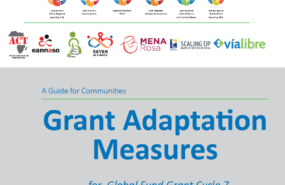HARM REDUCTION MESSAGES FOR THE 49TH GLOBAL FUND BOARD MEETING
- 10.05.2023 11:25
- Post Views: 192
Originally published on https://hri.global/publications/harm-reduction-messages-for-the-49th-global-fund-board-meeting/
Harm Reduction International (HRI), the South African Network of People who use drugs (SANPUD), VOCAL Kenya, Rumah Cemara and the Eurasian Harm Reduction Association (EHRA) shared key harm reduction messages for the 49th Global Fund Board Meeting (10-11 May 2023, Hanoi).
Investment in harm reduction from international donors and governments in low and middle-income (LMI) countries was just 5% of the US$2.7 billion UNAIDS estimates is required annually by 2025 for an effective HIV response among people who inject drugs. Global Fund Grant Cycle 7 represents a crucial moment for harm reduction programming and for community-led programming. However, as Window 1 and 2 countries progress to funding request submission, we are witnessing the serious obstacles that remain to ensuring harm reduction receives due prioritisation within funding requests.
We call on the Global Fund Board to utilise all evidence, tools and strategies available to ensure that HIV prevention for people who use drugs and wider key populations, including community-led responses, are central to Grant Cycle 7 HIV programming, in line with the Global Fund Strategy 2023-2025, the Global AIDS Strategy and Global Health Sector Strategies.
We call on Board Delegations to factor in the following priorities:
- Grant Cycle 7 must uphold the Global Fund Strategy 2023-2025 commitment to communities and community-led programming, in keeping with the UNAIDS 30-80-60 targets
- The Global Fund must do more to protect harm reduction as a ‘Program Essential’ in Grant Cycle 7
- The reduction in catalytic investments threatens the delivery of the Global Fund Strategy on maximising health equity, gender equality and human rights
- Grant Cycle 7 must fund efforts to increase domestic investment in harm reduction, and broader key population programming
- Funding for harm reduction in crisis must be protected and prioritised
Related News
Services for migrants and refugees from Ukraine – HIV/TB care with a focus on key populations
Due to the increasing flows of refugees from Ukraine because of Russia’s invasion of Ukraine, the EECA Regional Platform created a spreadsheet to fill contacts details of face-to-face and online services for refugees and migrants (with a focus on HIV/TB care and key population groups).
Regional Platform – EECA
This web-resource is a part of new regional communication and coordination project “Regional Civil Society and Community Support, Coordination and Communication Platform - EECA”, implemented by Eurasian Harm Reduction Association (EHRA).
Tags
See also
-
Grant Cycle 7 Reprioritization: How can communities prepare? 02.07.2025 12:03
-
Webinar: Using Global Fund's Data for Advocacy 12.06.2025 12:00







